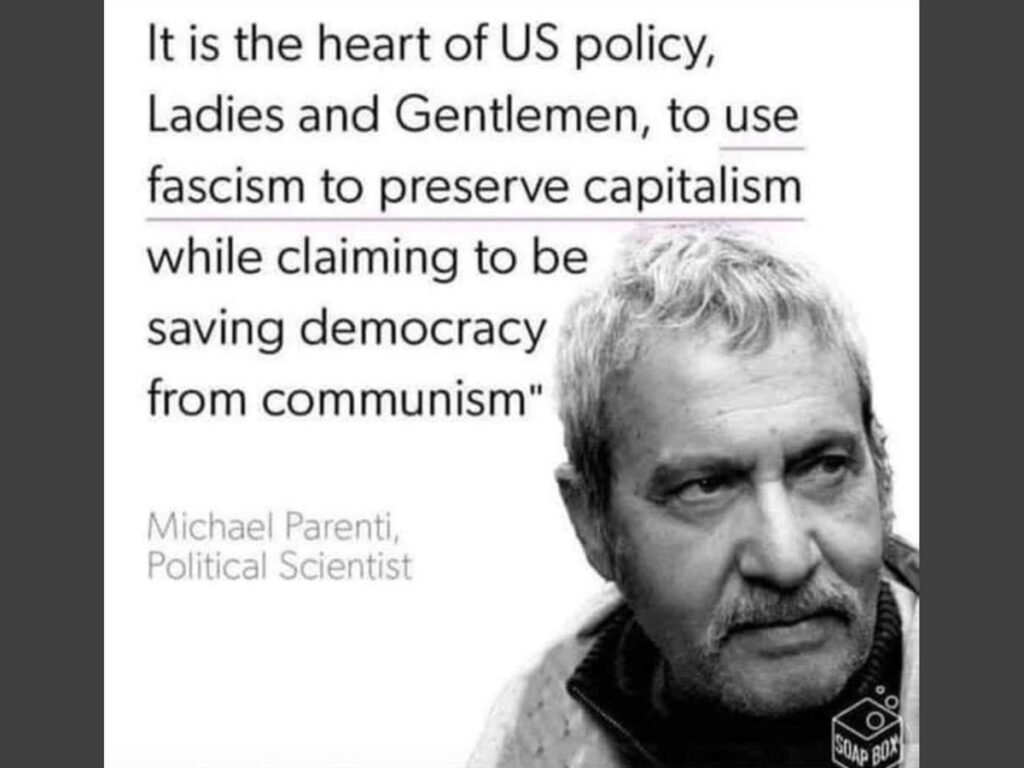(On March 8th, 2022, the news aggregation site Anarchist Federation published a post co-written by Alexander Reid Ross & Shane Burley. This is shocking, as Reid Ross has been exposed as an intelligence agent. Furthermore, Shane Burley continues to be promoted by AK Press, despite his close relationship with Reid Ross. As it seems that not everyone has gotten the memo about Alexander Reid Ross, we are republishing this piece, originally published as “Fascist Smears – What they tell us” on the Winter Oak blog.)
by Paul Cudenec
I have written extensively in recent years about the way in which accusations of “fascism” are used to smear radical opponents of a system that is, itself, a mutation of fascism.
The issue is addressed in Fascism Rebranded, in various contributions to The Acorn (see here, here and here) and in my political novels No Such Place as Asha (2019) and Enemies of the Modern World (2021).
One of the key figures in this ideological smear campaign, particularly in North America, has been Alexander Reid Ross (pictured).

As reported in Acorn 64, he is now working for a militaristic US “think tank” alongside many former “deep state” figures, including a former CIA chief.
Furthermore, the “think tank” in question is funded by Charles Koch, the 11th richest man in the world, renowned alongside his late brother for his opposition to the green movement.
As Rhyd Wildermuth asks in this excellent article: “Does it seem maybe a little weird that the man who helped create an atmosphere where far-left environmentalists are smeared as fascists is now working for an organization funded by one of the richest anti-environmentalists ever known?”
“Does it seem maybe a little weird that the man who helped create an atmosphere where far-left environmentalists are smeared as fascists is now working for an organization funded by one of the richest anti-environmentalists ever known?”

The only thing that surprises me about all this is that Reid Ross’s allegiances have been so openly confirmed.
It has long been obvious that the ideological war being waged against our political position was coming from the entity which we directly oppose – a big business mafia which hides its essential criminality behind an elaborate facade of “authority”, “law” and “democracy” and uses taxpayer-funded organizations like the CIA to defend its interests and power.
It has long been obvious that the ideological war being waged against our political position was coming from the entity which we directly oppose – a big business mafia which hides its essential criminality behind an elaborate facade.

The trouble is, says Wildermuth, that the unmasking of Reid Ross does not seem to have fundamentally changed anything: “Though I imagine most people will now view anything Alexander Reid Ross writes about fascism with suspicion, the framework he created won’t go away so easily”.
I think it is important for those who seriously wish to bring down this death-cult industrial system to look closely what Reid Ross and others like him have been trying to do.
By a kind of reverse engineering, we can then identify the political ideas which are most feared by the system and which we might then conclude are the best weapons with which to attack it.
I.
As Wildermuth explains, the Reid Ross narrative accepts historical fascist propaganda at face value by assuming that its aesthetics of “anti-modernism and anti-capitalism” reflected its real position.
The system regards modernism and capitalism as good things and thus anti-modernism and anti-capitalism as bad things. It therefore tries to discredit any opposition to modernism and capitalism (ie: opposition to its own domination) by declaring it “fascist” or on a slippery slope towards fascism.
Our response, as opponents of this modern capitalist system, should not be to run away from our core critique from fear of being branded “fascist” by paid agents of the system posing as holier-than-thou radical inquisitors.
Our response, as opponents of this modern capitalist system, should not be to run away from our core critique from fear of being branded “fascist” by paid agents of the system posing as holier-than-thou radical inquisitors.
Instead we should explode the system’s narrative by pointing out that historical fascism was thoroughly modernist and capitalist, despite its PR spin, and by communicating the real anti-capitalist and anti-modernist thinking which inspires us (see, for instance, the organic radicals project).
II.
The term “eco-fascism” has also been misused by Reid Ross for his own insidious purposes. Wildermuth writes that this label has come to mean not just “fascists who are environmentalists” but also “anyone who rejects the idea that industrial civilization is the best way for humans to live”.
He adds that Ross’s work has made many anti-industrial writers afraid to publish any longer. We see clearly here that the system, while busily promoting the fake-green climate capitalist movement and land-grabbing “conservationism” as part of its Great Reset, is afraid of real environmentalism, the kind which actually wants to abolish industrial degradation and pollution rather than just upgrade to a “bright green” and smart version.
We see clearly here that the system, while busily promoting the fake-green climate capitalist movement and land-grabbing “conservationism” as part of its Great Reset, is afraid of real environmentalism, the kind which actually wants to abolish industrial degradation and pollution rather than just upgrade to a “bright green” and smart version.

This realisation should remind us that industrialism is very much part and parcel of this system. We might also ask why it is that the system feels the need to smear anti-industrialists as “eco-fascists” rather than as “eco-extremists” or “Luddites”? Could it be that it knows such labels don’t really worry people? Does it know that the idea of abandoning industrial modernity and returning to a simple and healthy way of living will always appeal to large numbers of us? Is that why it has to attack the idea with the sledgehammer of a “fascist” accusation which is the one thing guaranteed to scare most people away?
The system’s dislike of anti-industrialism should amount to a positive recommendation for those who dislike the system. We should, of course, remind people that historical fascism was very much built on industrialism. And we can hurt this current fascistic system most by defying its smears and ideological taboos and pushing more and more firmly an anti-industrial message.
We should, of course, remind people that historical fascism was very much built on industrialism. And we can hurt this current fascistic system most by defying its smears and ideological taboos and pushing more and more firmly an anti-industrial message.

III.
Reid Ross depicts any talk of “organic community” as necessarily tending towards fascism because fascists used the term, while deliberately ignoring the profound differences between their hierarchical, top-down statist understanding of the notion and the grassroots, decentralized co-operative version promoted by real radicals.
We gather from this that the idea of organic community is seen as a threat by the system, as its control is based on a society of fragmented individuals cut off from all community and wholly dependent on top-down authority. It therefore tries to wipe all talk of organic community off the political map by labelling it “fascist” – a dirty trick which seems to work every time in certain gullible left-wing and anarchist circles.
If the system does not want radicals to talk about organic communities, then that is exactly what we should do! If it wasn’t an idea capable of inciting rejection of the current status quo in favour of a radically different way of living, then the system would not need to employ professional propagandists to steer people away from it. The system always tries to pretend that no alternative way of living exists, that no future is possible other than the one it has lined up for us. Stating the obvious truth that this is not so, and proposing another vision of how we might live (such as in decentralized organic communities), is a powerful and necessary basis for meaningful resistance.
IV.
Wildermuth points out that the reach of the “fascist” smearing has been stretched further and further by Reid Ross in recent years “encompassing now not only those who hold ‘extreme’ views about the environment or modernity, but also those who question US foreign policy on Syria, Israeli state oppression of Palestinians, the death of Jeffrey Epstein, or even the narrative of Russian influence on leftist beliefs”.
I would add that it has also been used against those of us who challenge the system’s Covid narrative – all across the world opponents of lockdowns, masks and vaccine passports have been branded “extreme right wing” in a very deliberate and obviously co-ordinated manner.
What this tells us, of course, is that these positions are also seen as threats by the system and that the “fascist” smear has worked so wonderfully well so far that it has decided to wheel it out again and again in the face of every new heresy threatening its ideological control. But this magic smearing wand cannot work forever.
What this tells us, of course, is that these positions are also seen as threats by the system and that the “fascist” smear has worked so wonderfully well so far that it has decided to wheel it out again and again in the face of every new heresy threatening its ideological control. But this magic smearing wand cannot work forever.

The more widely and inappropriately it is used, the more clearly it reveals itself for what it is. We can help that process along by ridiculising the smear, by openly laughing at it and by continuing to express whatever views and analysis seem correct and just to us, without once looking over our shoulders to see if Reid Ross and the fake-left Thought Police are about to pounce.
We might also use the many ideological warnings issued by Reid Ross and his kind in the opposite way to how they intended. Like the content warnings on social media, their red lights can often indicate to us a useful source of inspiration in our struggle to destroy the assumptions and illusions which they are trying to defend.
We can seize the momentum of their propaganda overreach and use it to inform and strengthen our opposition, while taking advantage of their identification of certain key ideas as particularly threatening in order to strengthen the impact of our resistance.
We can seize the momentum of their propaganda overreach and use it to inform and strengthen our opposition, while taking advantage of their identification of certain key ideas as particularly threatening in order to strengthen the impact of our resistance.
In this way we might rebuild a genuine, non-manipulated, radicalism capable of fighting back with courage and authenticity against the lies and deceptions of the system.